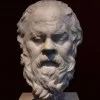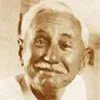The beginning of wisdom is the definition of terms.
[Η αρχή της σοφίας είναι ο καθορισμός των όρων]
Socrates (c.470-399 BC) Greek philosopher
(Paraphrase)
Frequently attributed to Socrates (or, our source for most Socratic material, Plato), but not found as such in their works.
That said, there are places where Socrates indicates that searching out the meanings of ambiguities is important, and his "Socratic method" often involves calling definitions (or their implications) into question.
For example, in Phaedrus, 256d [tr. Jowett (1892)], Plato has Socrates note:First, the comprehension of scattered particulars in one idea; as in our definition of love, which whether true or false certainly gave clearness and consistency to the discourse, the speaker should define his several notions and so make his meaning clear.
[εἰς μίαν τε ἰδέαν συνορῶντα ἄγειν τὰ πολλαχῇ διεσπαρμένα, ἵνα ἕκαστον ὁριζόμενος δῆλον ποιῇ περὶ οὗ ἂν ἀεὶ διδάσκειν ἐθέλῃ. ὥσπερ τὰ νυνδὴ περὶ Ἔρωτος -- ὃ ἔστιν ὁρισθέν -- εἴτ᾽ εὖ εἴτε κακῶς ἐλέχθη, τὸ γοῦν σαφὲς καὶ τὸ αὐτὸ αὑτῷ ὁμολογούμενον διὰ ταῦτα ἔσχεν εἰπεῖν ὁ λόγος.]
Possibly from this sentiment, Socrates' student Antisthenes said the very similar to the subject quotation, As recorded in Arrianus, The Discourses of Epictetus [Epictetus Diatibai], Book 1, ch. 17 [tr. Long (1877)]:The beginning of education is the examination of terms.
[ἀρχὴ παιδεύσεως ἡ τῶν ὀνομάτων ἐπίσκεψις]
Arrianus was a student of Epictetus, who had been a pupil of Antisthenes. In the full passage, Epictetus ties this phrase back to Antisthenes and Socrates, possibly establishing the phrasing as a something directly said by Socrates.
More discussion of this quotation:
Quotations about:
terms
Note not all quotations have been tagged, so Search may find additional quotes on this topic.
Although we have already spoken in the First Part touching the utility of the definition of terms, it is nevertheless so important, that we cannot have it too much impressed on our minds, since we may by it clear up a number of disputes, which have as their subject often only the ambiguity of terms, which one takes in one sense, and another in another. So that some of the greatest controversies would cease in a moment, if one or the other of the disputants took care to make out precisely, and in a few words, what he understands by the terms which are the subject of dispute.
Antoine Arnauld (1612-1694) French theologian, philosopher, mathematician
Logic, or the Art of Thinking [La Logique ou l’art de penser; The Port-Royal Logic], Part 4, ch. 4 (1662) [with Pierre Nicole] [tr. Baynes (1850)]
(Source)
Alternate translation:Although we have already spoken in Part I about the usefulness of defining one's terms, this is, however, so important that we cannot bear it too much in mind, since this is how countless disputes are cleared up whose cause is often merely an ambiguity in terms that one person takes one way and another person another way. Accordingly, some very serious arguments would cease in an instant if either of the disputants took the care to indicate clearly, in a few words, the meanings of the terms that are the subject of dispute.
[tr. Buroker (1996)]
We cannot define anything precisely! If we attempt to, we get into that paralysis of thought that comes to philosophers who sit opposite each other, one saying to the other, “You don’t know what you are talking about!”. The second one says, “What do you mean by know? What do you mean by talking? What do you mean by you?” and so on.
Richard Feynman (1918-1988) American physicist
The Feynman Lectures on Physics, Volume I, 8-2 “Motion” (20 Oct 1961)
(Source)
How many a debate could have been deflated into a single paragraph if the disputants had dared to define their terms?
William James (Will) Durant (1885-1981) American historian, teacher, philosopher
The Story of Philosophy, ch. 2 “Aristotle and Greek Science,” sec. 3 “The Foundation of Logic” (1926)
(Source)
This quotation is frequently misattributed (without citation) to Aristotle (sometimes using "dispute" instead of "debate"), but none of the sources pre-date this passage by Durant. Durant is speaking of Aristotle's development of logic, and his focus on definitions, but the full passage in context is clearly not a quotation:There was a hint of this new science in Socrates’ maddening insistence on definitions, and in Plato’s constant refining of every concept. Aristotle’s little treatise on Definitions shows how his logic found nourishment at this source. “If you wish to converse with me,” said Voltaire, “define your terms.” How many a debate would have been deflated into a paragraph if the disputants had dared to define their terms! This is the alpha and omega of logic, the heart and soul of it, that every important term in serious discourse shall be subjected to strictest scrutiny and definition. It is difficult, and ruthlessly tests the mind; but once done it is half of any task.




